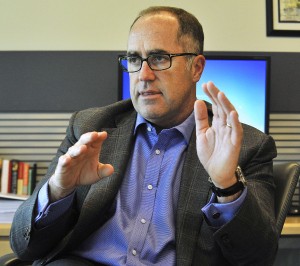Point72 in ceaseless quest to stay in compliance
BY ALEXANDER SOULE
Hearst Connecticut Media
In any given week at Point72 Asset Management, perhaps a million messages will flood the firm’s email, instant messaging and other digital entry points.
Point72 President Doug Haynes’ concern ”“ isolating any communication that could violate stringent financial compliance rules ”“ would seem a near-impossible task. But he has seen this kind of operation before, and within the walls of the CIA and National Security Agency, no less.
A resident of Ridgefield, Haynes last year was elevated to president of Stamford-based Point72, initially as an adviser to its predecessor company, SAC Capital, as founder Steven Cohen finalized a massive settlement with the Department of Justice, which stemmed from a probe into insider trading in the hedge fund industry. Though Haynes was accustomed to a culture of change, Point72 was in the midst of a particularly momentous pivot, transitioning into a family office closed to outside investment.

- Doug Haynes, president of Point72 Asset Management, talks to reporters in the company’s offices in Stamford. Photo by Jason Rearick
Under Cohen and Haynes, Point72 has continued to grow, nearing 900 employees ”“ about half of them in Stamford with nearly 20 open positions ”“ and more than $11 billion in assets under management.
Hot tips
In any given week, Point72 receives countless inbound communications, whether via email, text messages or other channels. For a firm whose executives say is set on complying with all laws and regulations, it is a major undertaking to assess, classify and, if necessary, sequester messages it does not want employees receiving.
“It’s amazing ”“ we have to make sure all that is in compliance,” Haynes said. “Humans can’t do it, so we use very advanced technologies to do it. … We can intercept a lot of it before people ever see it, so if there is something that creates even a yellow flag ”“ even a concern ”“ it can be picked out.”
Point72 developed its own systems to do the task, Haynes said, despite the availability of commercial software. A Woburn, Mass.-based company called Catelas says its software can analyze in seconds the volume of messages it took authorities several years to comb through in their quest to find links between tipsters in the Galleon insider trading case on Wall Street. That ring resulted in jail sentences for several executives, including Rajat Gupta, McKinsey’s former managing director who has a home in Westport, and intensified scrutiny of SAC Capital, which ultimately led to the company paying $1.8 billion last year to move on from the DOJÂ investigation.
A Hedge Fund Technology Group exists that helps the industry keep up with the latest systems available to help them comply with an ever-widening array of rules, with its leaders including Nicholas Lageros, until last year with Greenwich-based Viking Global Investors. Lageros recently told the newsletter Hedge Fund Alert that while some hedge funds tackle the task by creating their own systems, “it is not the kind of technology I want to have to build myself.”
Long accustomed to leveraging internally built systems to score big trading profits, Point72 has turned its talents to policing itself in the digital world.
“Usually, it comes down to language,” Haynes said. “The industry is fraught with language, so people will use language (like) ‘hot tip.'” The list of words is very long, and any word, any phrase that causes any concern, we intercept.”
National security
At West Virginia University, Haynes immersed himself in computer programming while pursuing a major in mechanical engineering. With the CIA rapidly building up its computational capabilities in the 1980s, it was combing the land for college graduates with Haynes’Â skill set.
“James Bond is not the right image ”“ the nerdiest programmer you’ve ever seen is the right image,” Haynes said. “The intelligence branch of the government was … scaling up technology faster than the people could do anything with it. I think they had the assumption that a lot of the people who already worked in the intelligence community would just learn how to use this stuff, and they found that wasn’t going to work.”
Haynes worked for a joint CIA-National Security Agency group outside Fort Meade, Md. His team was tackling natural language processing and searching for terms and context in masses of unstructured data. At the time, he said, he did not grasp the implications for future business applications of the technology.
“In the simplest terms, the most interesting thing was how to take a stack of paper this high,” Haynes said, holding his hand up about a foot before dropping it to about three inches, “and make it a stack of paper that big, and not miss anything.”
Private sector
With his first employment term at the CIA coming to a conclusion and projecting as a career programmer, Haynes elected to leave. He went to General Electric, landing in the former GE Plastics office in Pittsfield, Mass., through which many of the giant’s senior executives were cycled on their way to corner offices at GE’s Fairfield headquarters. In Pittsfield, Haynes rubbed elbows (or threw elbows in lunchtime pickup basketball games) with GE CEO Jeff Immelt and former vice chairman John Krenicki, among others.
Haynes would leave GE to join the global consulting firm McKinsey & Co., starting in Atlanta and eventually leading its Stamford office and then its Northeast operations from New York.
Haynes is early into the third stage of his career with Point72, and has praise for the willingness with which his colleagues have embraced a new era of intensified compliance.
“We don’t want data inside the building that we would have any concern about,” Haynes said. “We … isolate data and then we test it, and we test the compliance procedures of the data provider. And if it doesn’t pass, it never even comes in for initial analysis. That probably makes us slower than other people, but we are unwilling to trade off speed for integrity.”
Hearst Connecticut Media includes four daily newspapers: Connecticut Post, Greenwich Time, The Advocate (Stamford) and The News-Times (Danbury). See stamfordadvocate.com for more from this reporter.
